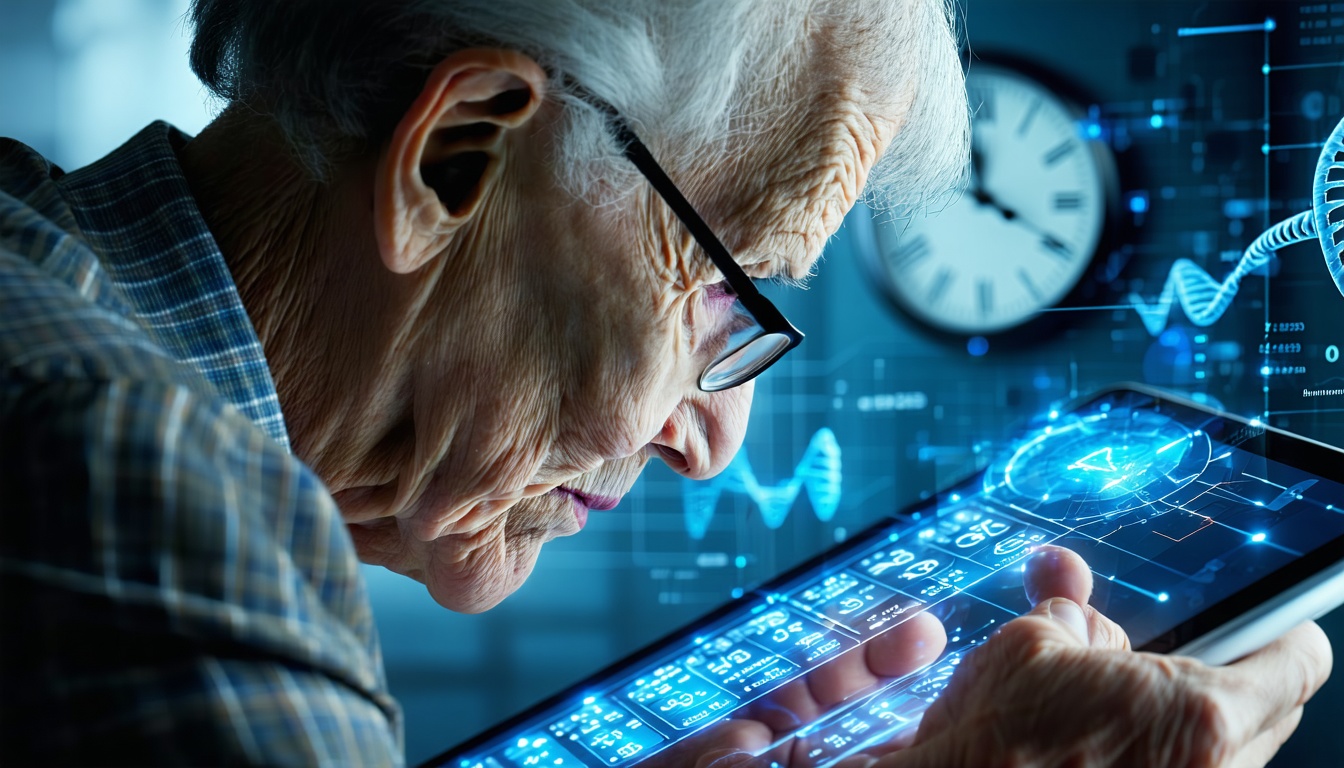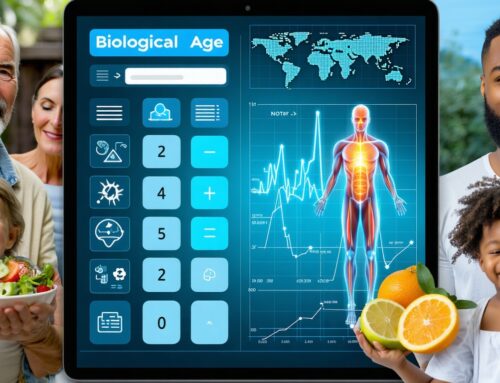Understanding Biological Age
Biological vs. Chronological Age
Let’s chat about age, shall we? There’s the age you celebrate with cake and candles—your chronological age. It’s just the number of years you’ve been around. But then there’s your biological age, which is a bit more mysterious. It’s all about how your body is holding up, based on things like your health and lifestyle choices. So, you might be 40 on paper but feel like you’re 30—or, heaven forbid, 50—depending on how you’ve been treating yourself.
| Age Type | Definition |
|---|---|
| Chronological Age | Number of years since birth |
| Biological Age | Age based on how your body is doing |
Getting the hang of these two types of age is a game-changer if you’re keen on living longer and healthier. For more juicy details, swing by our page on biological age vs chronological age.
Factors Influencing Biological Age
What makes your biological age tick? It’s a mix of lifestyle, environment, and those genes you got from your folks. Here’s the lowdown on what matters:
- Exercise: Keeping active is like a magic potion for your muscles and heart. Want to know more? Check out how exercise affects biological age here.
- Diet: Eating right—think nutrients, antioxidants, and low-sugar foods—can keep you feeling spry. Dive into the diet-biological age connection here.
- Stress: Stress is a sneaky age-accelerator, messing with your cells and cranking up inflammation. See how stress plays a role here.
- Sleep: Catching quality Z’s is crucial for fixing up your cells and staying healthy. Bad sleep habits? They can age you faster. Learn more about sleep’s impact here.
- Inflammation: Chronic inflammation is like a fast-forward button on aging. Get the scoop on inflammation here.
| Factor | Impact on Biological Age |
|---|---|
| Exercise | Keeps muscles and heart in shape |
| Diet | Packs in nutrients and antioxidants |
| Stress | Wreaks havoc on cells and ups inflammation |
| Sleep | Essential for cell repair and health |
| Inflammation | Speeds up aging and causes health issues |
Knowing these factors means you can start making choices that shave years off your biological age. Curious about how to figure out your biological age? Check out our biological age calculator and explore different biological age assessment tools.
Taking charge of your biological age is all about smart lifestyle tweaks. Whether it’s hitting the gym, eating better, or chilling out, you’ve got the power to steer your aging process. For more tips on keeping your biological age in check, browse our articles on biological age and longevity and biological age and vitamins.
Biomarkers for Biological Age
Getting a grip on the markers that tell you how old your body really feels is like having a backstage pass to your own health show. These little clues, or biomarkers, spill the beans on how you’re holding up and what the future might hold. Let’s chat about three big players: telomere length, epigenetic clocks, and frailty.
Telomere Length
Think of telomeres as the plastic tips on your shoelaces, but for your chromosomes. Every time your cells divide, these tips get a bit shorter. When they get too short, it’s like your cells are running out of steam. Short telomeres are linked to a higher chance of kicking the bucket sooner than you’d like. Keeping an eye on these can give you a sneak peek into how your biological age stacks up against the candles on your birthday cake.
| Age Group | Average Telomere Length (kb) |
|---|---|
| 20-30 years | 8.5 |
| 31-40 years | 7.8 |
| 41-50 years | 7.1 |
| 51-60 years | 6.4 |
| 61-70 years | 5.7 |
Curious about how these little guys affect aging? Check out our piece on biological age and telomeres.
Epigenetic Clocks
These clocks aren’t the kind you hang on the wall. They’re all about the patterns in your DNA that change as you age. They can tell you how old your body thinks it is, and they might even help us figure out how to hit the pause button on aging. These clocks are like a crystal ball for seeing how your lifestyle choices are aging you.
| Epigenetic Clock | Accuracy (years) |
|---|---|
| Horvath Clock | ±3.6 |
| Hannum Clock | ±3.3 |
| PhenoAge | ±2.9 |
Want to dive deeper into these timekeepers? We’ve got a guide on biological age assessment tools just for you.
Frailty as a Biomarker
Frailty is like your body’s way of saying it’s not as spry as it used to be. It’s a mix of feeling weaker, having less get-up-and-go, and your body not working quite like it used to. It’s a handy way to spot if you’re aging faster than you should be, even before it becomes obvious.
| Frailty Score | Biological Age Estimate |
|---|---|
| 0-1 (Non-frail) | Chronological Age |
| 2-3 (Pre-frail) | +5 years |
| 4-5 (Frail) | +10 years |
Want to know more about how frailty plays into aging? Check out our article on biological age and longevity.
By getting to know these biomarkers, you can get a better handle on your biological age and start making moves to boost your health and stick around longer. For a full-on approach to figuring out your biological age, take a peek at our biological age calculator.
Calculating Biological Age
Figuring out your biological age can give you a sneak peek into your health and how long you might stick around. Let’s break down two main ways to do this: DNA age tests and epigenetic clocks.
DNA Age Tests
DNA age tests are like a crystal ball for your aging process, showing if you’re aging like a fine wine or more like a banana. Imagine you’re 50, but the test says you’re 45—you’re aging slower than your buddies, living life like a spry 45-year-old (NPR).
These tests rely on DNA methylation, where tiny chemical tags called methyl groups hitch a ride on your DNA. The more methylated spots, the faster you’re aging. It’s like counting the gray hairs on your DNA (NPR).
| Age | DNA Age Estimate | Aging Rate |
|---|---|---|
| 50 | 45 | Slower |
| 50 | 55 | Faster |
Want to dive deeper into DNA age tests? Check out our page on biological age testing methods.
Epigenetic Clocks in Action
Epigenetic clocks are another way to measure biological age, and they’re pretty nifty. They use DNA methylation to give a solid guess of your biological age, and they might even help turn back the clock on aging (NCBI).
These clocks use smart algorithms to spit out reliable age estimates. Their accuracy ranges from 0.87 to 4.76 years, with R2 values from 0.25 to 0.94. It’s like having a math whiz predict your age (NCBI).
| Method | Prediction Accuracy (Years) | R2 Value |
|---|---|---|
| Epigenetic Clocks | 0.87 – 4.76 | 0.25 – 0.94 |
Curious about how these clocks tick? Check out our article on biological age assessment tools.
By getting the hang of these methods, you can see where you stand on the aging scale and maybe even slow it down. Dive into our resources on biological age and longevity and biological age and diet to learn how your lifestyle can tweak your biological age.
Impact of Lifestyle on Biological Age
Healthy Habits
You know, the way you live can really mess with how old your body feels. You might be 40 on paper, but your body could be feeling 30 if you play your cards right. Regular exercise, keeping your weight in check, and eating like you care about yourself are big players in keeping your body young (Healthline). Check out these habits that can help:
- Exercise: Moving your body regularly keeps your muscles strong, your heart happy, and inflammation at bay. Curious about how exercise can keep you young? Visit our page on biological age and exercise.
- Healthy Diet: Eating foods that don’t spike your blood sugar and paying attention to what nutrients you’re getting can keep your body feeling young. Load up on fruits, veggies, and whole grains to give your cells the good stuff they need (NPR). Want to know more about how your diet affects your biological age? Click here.
- Weight Management: Keeping your weight in a healthy range helps dodge chronic diseases and keeps you feeling good overall.
- Stress Reduction: Finding ways to chill out, like through meditation or yoga, can slow down the aging process. Check out how yoga and pilates can help keep you young.
- Adequate Sleep: Getting enough quality sleep is like hitting the reset button for your cells. Learn more about how sleep affects your biological age here.
Accelerators of Biological Aging
Some choices can speed up how fast your body feels older than it should. Here are a few things that can age you faster:
- Smoking: Lighting up speeds up your body’s aging clock and ups your risk for all sorts of nasty stuff. For more info, check out our page on biological age and smoking.
- Unhealthy Diet: Eating too much junk food, sugar, and bad fats can cause inflammation and stress your body out, making you age faster.
- Sedentary Lifestyle: Sitting around too much leads to muscle loss, a sad heart, and a higher chance of getting sick.
- Exposure to Toxins: Stuff like pesticides, plastics, and other chemicals can mess with your body’s age. Learn more about the effects of pesticides, plastics, phthalates, and parabens on your biological age.
- Chronic Stress: Being stressed all the time can throw your hormones out of whack and cause inflammation, speeding up aging.
By getting a handle on how your lifestyle affects your biological age, you can make choices that keep you feeling young and healthy. Want to figure out your biological age? Check out our biological age calculator and explore different biological age assessment tools.
Advancements in Biological Age Testing
Machine Learning Algorithms
Machine learning (ML) is shaking up how you can figure out your biological age. These smart algorithms crunch tons of data to give you a pretty good guess of how old your body really is, compared to your actual age. They can predict with an accuracy of about 0.87 to 4.76 years, and R2 values from 0.25 to 0.94 (NCBI). In simple terms, ML can tell you how your body is holding up over time.
The cool thing about ML is that it uses a mix of biomarkers and health data to guess your biological age. For instance, it looks at stuff like homeostatic dysregulation (HD) and allostatic load (AL), along with polygenic risk scores (PRS), to see how you’re aging and what health issues might pop up. This can help you get a grip on what’s speeding up or slowing down your aging process.
Dr. Daniel Belsky and his crew, working with Dr. Terrie Moffitt’s team at Duke University, came up with a nifty tool called DunedinPACE (Dunedin Pace of Aging Calculated from the Epigenome). This “speedometer” checks how fast or slow you’re aging by looking at changes in your DNA, especially DNA methylation patterns. If you’re aging faster according to DunedinPACE, you might be at a higher risk for health problems, chronic diseases, or even an early exit (NIH Research Matters).
Genetic Testing for Biological Age
Genetic testing is another hot ticket for figuring out your biological age. This method digs into your DNA to find genetic markers linked to aging. By checking out these markers, scientists can guess your biological age and give you a peek into your health and how long you might stick around.
One of the coolest things in genetic testing for biological age is epigenetic clocks. These clocks track changes in DNA methylation patterns, which are like little chemical tweaks to your DNA as you get older. The DunedinPACE tool we talked about earlier is one of these clocks that can spill the beans on your aging process.
Besides epigenetic clocks, genetic testing can also spot specific genes that mess with your biological age. Take the Comprehensive Assessment of Long-Term Effects of Reducing Intake of Energy (CALERIE) study, for example. It looked at how cutting calories (CR) affects humans. Folks in the CR group cut their calories by about 12.5%, which slowed down their biological aging, as seen in clinical blood tests. Plus, CR changed gene expression related to muscle building, repair, body clock regulation, and aging, hinting at perks for muscle health and keeping aging at bay (NIH Research Matters).
By tapping into these advanced testing methods, you can get a better handle on your biological age and take steps to boost your health and stick around longer. For more on how to figure out your biological age, check out our biological age calculator and explore different biological age assessment tools.
Strategies for Improving Biological Age
Calorie Restriction Studies
Cutting back on calories might just be your ticket to slowing down the aging train. The CALERIE study, backed by the NIH, took a deep dive into how eating less can keep you feeling younger. Folks who trimmed their calorie intake by 12.5% saw their biological clocks tick a bit slower, as shown by changes in their blood markers.
The study also found that eating less tweaked genes linked to muscle growth, repair, and even your body’s internal clock. This could mean better muscle health and a shot at keeping aging at bay. Here’s a quick look at what they found:
| Study Group | Calorie Reduction | Biological Aging Pace |
|---|---|---|
| CR Group | 12.5% | Slower |
| Control Group | 0% | Normal |
Curious about how your diet can affect your biological age? Check out our article on biological age and diet.
Reversing Aging Effects
Science is cooking up some cool ways to turn back the clock on aging. One study gave old mice a boost by injecting them with plasma from human umbilical cord blood, which is packed with a protein called TIMP2. This little protein helped the mice sharpen their learning and memory skills, hinting that plasma from young folks might help tackle brain aging.
These findings suggest that some aging woes, like memory loss, might be fixable. Here’s a snapshot of the study:
| Treatment | Improvement |
|---|---|
| TIMP2 Injection | Learning and Memory |
Dr. Tony Wyss-Coray and his crew also showed that you can gauge how fast different parts of your body are aging by checking certain proteins in your blood. If one organ is aging faster, it might be more prone to disease. Knowing which parts are aging quicker can help you focus on keeping them healthy.
Want more tips on keeping your biological age in check? Dive into our articles on biological age and exercise, biological age and stress, and biological age and sleep.






